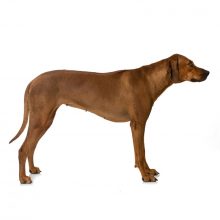Rhodesian Ridgeback
Lifestyle Needs

The Rhodesian Ridgeback (so called because of the ridge of hair growing the wrong way down its spine) is a large, powerful and speedy dog. He was once a hunting dog and guard dog. He is typically loyal and protective of his family but needs firm and experienced handling. He also needs to live in a house with a garden and should have plenty of energetic exercise. His coat is short but needs grooming once a week. Average lifespan 9 years.
Genetic Diversity
(Known as Coefficient of Inbreeding: 'COI'. It should be as low as possible.)
The UK Kennel Club breed average COI is 5.9% - See 'A Beginners Guide to COI'
Gene Pool Size
(Known as Effective Population Size: 'EPS')
n/a
EPS is a measure of how many individuals are contributing genetically to a breed population. It is a measure of the size of the gene pool in a breed. Lower than 100 is considered critical by conservationists and below 50 brings a breed close to extinction. For more information see the Kennel Club article.
Health and Welfare Problems due to Conformation
(Body shape and physical characteristics)
- The ridge along the spine of the Rhodesian Ridgeback is an abnormality and associated with Dermoid sinus (a tubular indentation of the skin over the spine – these can run deep into the tissues and lead to infection, serious disease and pain)
- Gastric dilatation volvulus (GDV) (Bloat/Torsion) Common in deep chested breeds.
BVA/KC Health Schemes: www.bva.co.uk/chs
- Hip dysplasia: breed 5 year mean score 7.5 (parents should be lower)
- Elbow dysplasia: score should be as low as possible
- Eye Scheme and annual testing for Cataract, Entropion, Eversion of the Cartilage of the Nictitating Membrane
Estimated Breeding Values (EBVs) : EBVs for Hip Dysplasia are available for this breed
www.thekennelclub.org.uk/about-ebvs
DNA Tests Available
DogWellNet and IPFD Harmonisation of Genetic Testing for Dogs (HGTD)
www.dogwellnet.com/breeds
- Haemophilia B (Factor 1X deficiency)
- Juvenile Myoclonic Epilepsy (JME)
- Degenerative myelopathy (DM)
Availability of a DNA test does not mean that it is always necessary or even desirable for breeders to use this test.
Other Breed-Specific Health Screening Schemes
- Dermoid sinus check (puppies)
- Bitches under 2 years not to produce litter
- Bitches not to produce more than 3 litters in their lifetime
- Bitches not to produce more than 1 litter within a 12 month period
Ask the breeder to show you the certificates for the above tests/screening for both parents. If any of the above tests have not been considered necessary by the breeder (and there may be good reasons), ask her to explain why.
Other Diseases Reported
(For which there are currently no genetic or screening tests for sire or dam)
- Cancer: Osteosarcoma; soft tissue cancers
- Panosteitis
- Lumbosacral transitional vertebrae
Ask the breeder about the medical history of the parents, grandparents and great grandparents. Consider carefully whether to purchase a puppy if some of these or other diseases are in the family line.
Ask about the breeder’s policy in cases of serious genetic diseases occurring to your puppy in later life. Good breeders will request to be informed of such events in order to improve future breeding decisions.
You are strongly advised to buy from a breeder who uses (or is prepared to use) the AWF Puppy Contract and Puppy Information Pack (PIP): www.puppycontract.org.uk
The breeder should also be familiar with the CFSG/DBRG Code of Practice for Dog Breeding